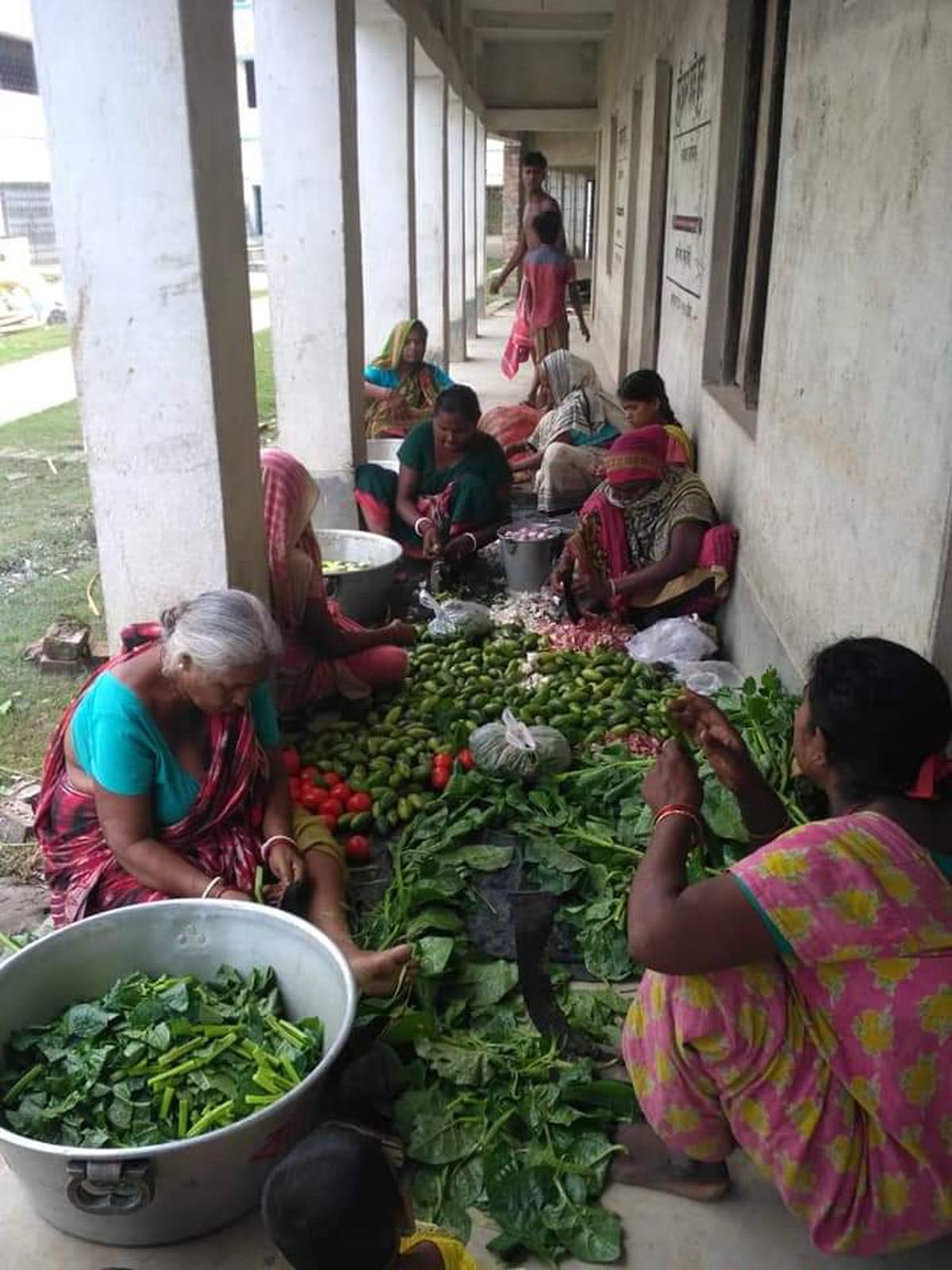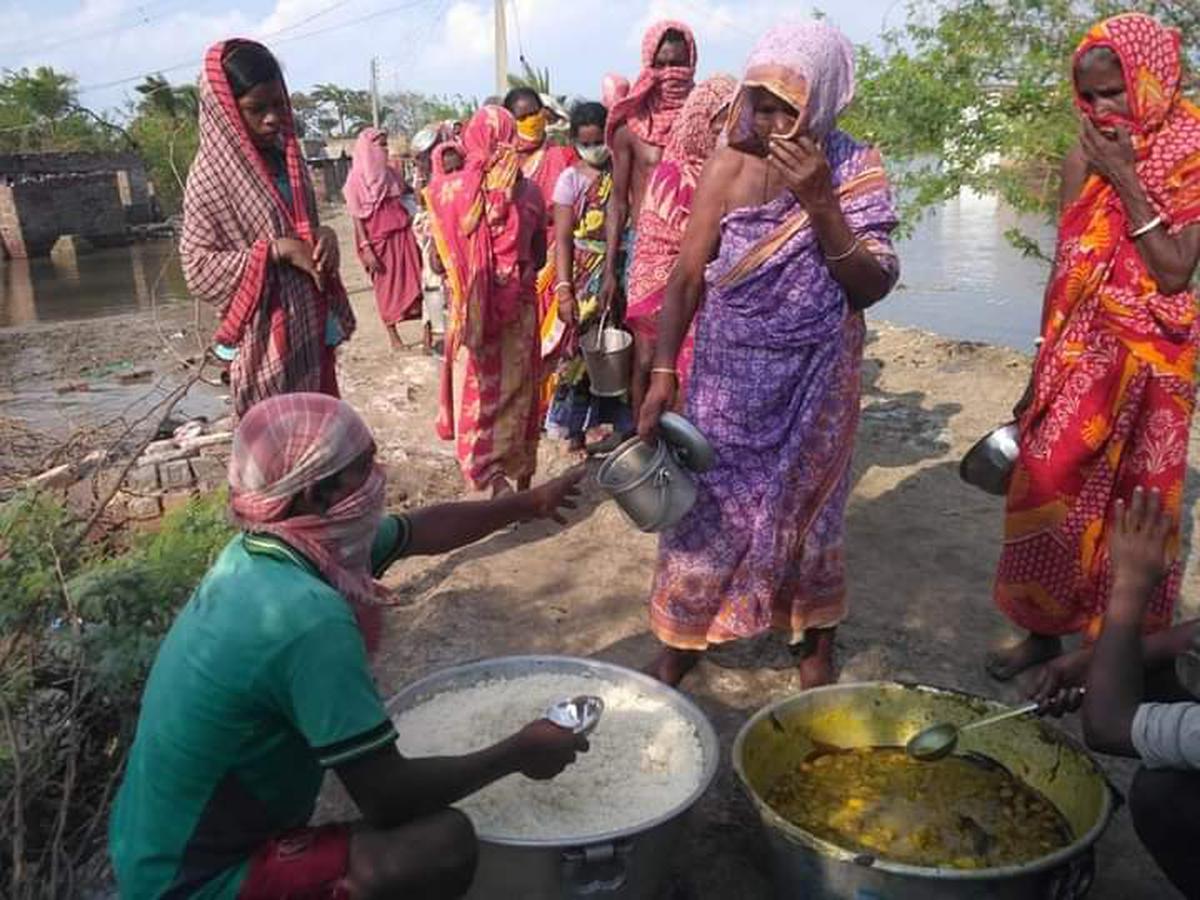West Bengal-based NGO Pather Pathik “makes it a point to gain first-hand knowledge of people’s troubles and accordingly try to offer help”, according to founder Sumita Mukhophadhyay.
| Photo Credit: Special Arrangement
Soon after Cyclone Amphan swept through West Bengal in May 2020 — this was a time when the country at large was in the grip of the COVID-19 pandemic — Kolkata-resident Sumita Mukhopadhyay, an academician, and her son left for the Sundarbans along with some relief material. Since Professor Mukhopadhyay’s husband was in hospital at the time, her daughter-in-law stayed back, joining the two in their subsequent visits to the affected villages.
WIthin days, Prof. Mukhopadhyay, a teacher at Bethune College, realised that the destruction was too widespread for her family to handle alone. She got in touch with four women teachers in other State Government–run colleges — Aparna Sen of Lady Brabourne College; Shilpi Acharyya and Devjani Sengupta of Taki Government College and Subarna Mondal of Sanskrit University had all worked together with her in the past — and formed an NGO.

Following Cyclone Yaas in May 2021, Pather Pathik ran two community kitchens simultaneously at the villages of G-Plot (in South 24 Parganas) and Sitalia (North 24 Parganas).
| Photo Credit:
Special Arrangement
Joined by three research fellows, Soumik Saha (the son), Dipanwita Dutta (the daughter-in-law), both actually based in Germany, and Pia Ghosh in Lady Brabourne College, they started what was initially known as Pather Sathi and later as Pather Pathik.
“I still remember the first journey I made to the village of Mousuni with my son. We carried tarpaulin, mosquito nets, some puffed rice, milk, rice, lentil, oil, sugar, salt, biscuits, carbolic acid and sanitary napkins,” Prof. Mukhopadhyay tells The Hindu.
Within weeks, the members of Pather Pathik found themselves stationed in one of the worst-affected areas, running a community kitchen in the village of Ghuni in North 24 Parganas. They served food to hundreds of people for seven days. Following Cyclone Yaas in May 2021, they ran two community kitchens simultaneously at the villages of G-Plot (in South 24 Parganas) and Sitalia (North 24 Parganas).
Today, one of Pather Pathik’s core missions is to help “tiger widows” — women whose husbands have been killed by tigers in the Sundarbans. According to the group, these are people who have been rendered exceptionally vulnerable by the escalating human-tiger conflicts in the region.
“Through rigorous research and communication, we have identified this group as being in urgent need of assistance, and our programmes are designed to empower and uplift their lives,” says Shilpi Acharyya, another member of the group, which now has three more professors and one more research scholar on board.
The writer Parimal Bhattacharya, author of the popular Field Notes from a Waterborne Land, had this to say about the group: “Sundarbans is so close to Kolkata, and yet remains outside [the] optical fields of most middle-class Kolkatans. The situation there is so dire, such despair and crises unfolding at many levels. When I learnt they are doing work for the tiger widows, I was really very happy because despite all the international media attention these women have been getting for quite some time, nothing much has really been done for them.”
Prof. Mukhopadhyay adds: “This is perhaps the only NGO that was conceived and is being run by a group of women, who are all academicians in government colleges. We visit affected areas ourselves, survey the situation, find out the needs of common people. Our uniqueness lies in not sending general articles mindlessly for the affected people but in helping people exactly with the things they require in their daily life. We make it a point to gain first-hand knowledge of people’s troubles and accordingly try to offer help.”

In addition providing food in community kitchens, Pather Pathik also aids in educating the children of “tiger widows”, women whose husbands died due to human-animal conflict, through school enrolment and skill-development workshops.
| Photo Credit:
Special Arrangement
She says the funds for the NGO’s relief work come from donations made by the members themselves, as well as those from friends, relatives and acquaintances.
Prof. Mukhopadhyay says the group has decided to do “something concrete” for the “tiger widows” rather than just temporarily providing them with some necessary household items and groceries.
“We first gave them [rations] for two months, then we decided to do something for the education of their small children. We tried to make arrangements to ensure that they continued with their school education. From 2020 to 2023, we enrolled four children of tiger widows in residential schools, three of them girls.
While some “tiger widows” have migrated to Kolkata for jobs, for those who have stayed back in the villages the group is organising workshops that teach snack-making and tailoring so that they don’t have to go to forests to gather honey or catch crabs and fish.
“In Hasnabad in North 24 Parganas, we are working for a group of women who have either been rescued from trafficking or are victims of domestic violence. We work in collaboration with KEYA [Katakhali Empowerment and Youth Association]. We have gifted them two laptops so that the educated among them can learn basic work like sending emails and data-entry and eventually open a centre offering computer-based services. We will soon help them opening such a shop,” Prof. Mukhopadhyay says.